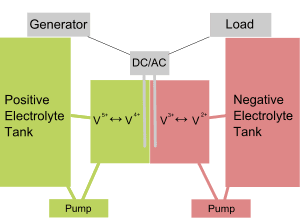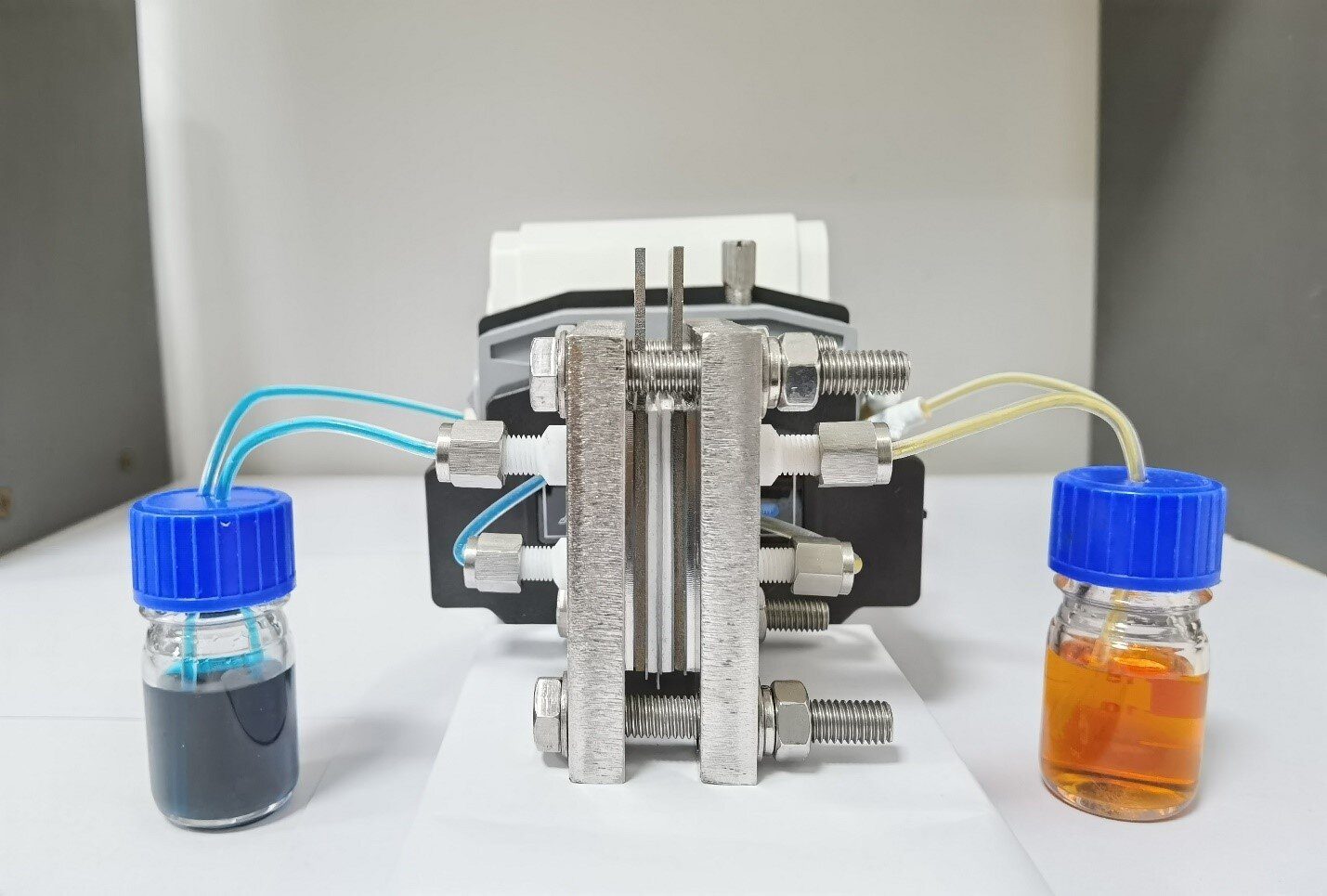
Diesel-addicted remote communities pin hopes on energy storage technology
In Sandy Lake, Ontario (population 2,650), the diesel fuel that powers this remote community a thousand miles northwest of Toronto costs around $9 a gallon. And even then, in its harsh northern climate, it provides electricity only some of the time.
“There’s always problems, there’s always power outages,” grumbles Harry Meekis, capital projects manager for the Sandy Lake First Nation. “Diesel is the only source of service that we have right now. Whether that’s affordable or not, that’s the only source we have,” he added.
Needless to say, they’re looking for alternatives, and a Canadian mining company thinks it has found one in a new battery using the little-known metal vanadium.
Without any feasible storage options, renewable sources like wind turbines and solar panels can generate power only when the wind blows and the sun shines. With storage, the power could be stored and distributed whenever needed, one of the reasons storage technology is being described as the “holy grail” in renewable energy.
Multiple battery technologies are being experimented with right now, including lithium and cadmium flow batteries, but Vancouver, British Columbia-based American Vanadium thinks vanadium flow batteries could have several distinct advantages, including durability and scalability.
The battery relies on an electrolyte compound made of a mixture of vanadium, a metal commonly used to harden steel, and sulfuric acid in a container that can continuously charge and discharge. Unlike most batteries, the electrolyte would not degrade over time because the anode and cathode aren’t made out of competing material. And, since it’s mostly made of water, it’s nontoxic and can’t explode, according to Ron MacDonald, executive chairman of American Vanadium.
Mining tomorrow, revenue today
American Vanadium has taken a two-pronged approach to bringing vanadium batteries to market. The company has bought the rights to a mountainside in central Nevada that’s home to a uniquely pure vanadium deposit. It hopes to create an open-pit mine to extract the metal in about 18 months, once it has finished the permitting process with the U.S. Bureau of Land Management.
The site, known as Gibellini Hill, contains vanadium deposits at 99.995 percent purity, according to MacDonald.
“Which means it’s up to purity that we can put into battery market,” he said. “The deposit is unique. Metallurgists are saying there’s nothing else really with it.”
American Vanadium’s mine may not be operational for two years, but the company still hopes to start selling vanadium flow batteries soon. It has secured an offshore supply of electrolyte and recently signed a sales agreement with Austrian energy company Gildemeister for exclusive use of the company’s CellCube technology, a scalable energy storage system.
Gildemeister is already selling CellCubes across Europe and Asia, with the battery storing energy in towns from Germany to Siberia to Saudi Arabia. This durability in a variety of climates was attractive to American Vanadium board members.
“Gildemeister has over 100 [CellCube] installations, and over 40 significant ones,” said MacDonald. “They’ve really built it well, and they’ve built it for these climates.”
The Latest Bing News on:
Flow Battery
- Researchers repurpose commonplace chemical with incredible properties in new battery design: 'Exhibited remarkable cycling stability'on May 2, 2024 at 4:15 am
Scientists have created a new type of battery for grid energy storage by repurposing a chemical commonly used in water treatment plants. They say it has huge potential to increase grid resiliency.
- Net zero boost: 40 jobs in pipeline as West Lothian battery storage pioneer secures investmenton May 2, 2024 at 3:56 am
The UK Infrastructure Bank is making a £25 million direct equity investment into Invinity Energy Systems, a manufacturer of vanadium flow batteries, to support the commercial development of ...
- UK battery storage pipeline expands to over 95GWon May 1, 2024 at 5:00 pm
In related news, the UK Infrastructure Bank (UKIB) today announced it is to provide £25m in direct equity investment into flow battery manufacturer Invinity Energy Systems in a bid to support the ...
- What People Are Getting Wrong this Week: AI-powered Gadgetson May 1, 2024 at 3:00 pm
Tech-interested people and early adopters have been extremely hyped at the promise of portable or wearable AI assistants since the Humane AI pin was announced in 2023, but the first two products in ...
- SES AI partners with WPI to develop lithium-metal battery recycling technologyon April 30, 2024 at 5:00 pm
His research lab at WPI focuses on the study of new electrodes and materials for energy storage, including lithium-ion batteries; supercapacitors; flow batteries; battery manufacturing; battery safety ...
- Tribal company and Oregon battery startup create unique partnership in pursuit of clean energyon April 29, 2024 at 2:03 pm
Madisen McCleary, Skip Tech's vice president of engineering, makes a hydrophobic coating for the interior of a flow cell for the startup's hydrogen ...
- Menifee battery storage plant will be one of largest in the U.S.on April 28, 2024 at 1:02 pm
Instead, the 2,000-megawatt battery storage facility taking shape in Menifee will link renewable energy produced in off-peak windows with electric utilities in need of peak-hour juice. Billed as one ...
- 3 Battery Stocks That Could Be Multibaggers in the Making: April Editionon April 28, 2024 at 3:30 am
InvestorPlace - Stock Market News, Stock Advice & Trading Tips Battery stocks have been depressed in the last few quarters. That does not ...
- IDTechEx Discusses Future Market Penetration of the Redox Flow Batteryon April 25, 2024 at 6:35 am
The evolution of the redox flow battery over several decades has seen various chemistries being developed, commercialized, or even abandoned due to factors such as poor electrochemical reversibility ...
- Going with the flow: Research dives into electrodes on energy storage batterieson April 24, 2024 at 9:54 am
As a grid-scale energy storage system, flow batteries have gained increasing attention as a means to address the challenges associated with fluctuations and intermittency in renewable energy sources.
The Latest Google Headlines on:
Flow Battery
[google_news title=”” keyword=”Flow Battery” num_posts=”10″ blurb_length=”0″ show_thumb=”left”]
The Latest Bing News on:
Energy storage
- EGAT and Sweden partner on biomass and hydrogen storageon May 1, 2024 at 9:56 pm
The MOU mandates the exchange of knowledge and technologies in the two sectors. The Electricity Generating Authority of Thailand (EGAT) signed a memorandum of understanding with the Swedish Trade ...
- Sunnova Energy: Long-Term Growth Potential Justifies Buy Rating Despite Short-Term Setbackson May 1, 2024 at 5:16 pm
Inc. engages in providing solar and energy storage services. It also offers services to customers who purchased their solar energy system through unaffiliated third parties. The company was founded in ...
- Energy storage solutions key to green, reliable electricityon May 1, 2024 at 5:00 pm
Energy storage can help fill the gap, with different types of technologies playing different roles for different durations.” Mr. Miller has been working with a number of partners to advance an energy ...
- Energy Storage: A New Asset Class Buyers Of Power Should Consider Investing Inon May 1, 2024 at 8:00 am
Investing in energy storage doesn’t just provide a pathway for reducing carbon emissions; it’s also a pathway for potential savings on electricity and energy costs.
- Duke Energy completes upgrades to pumped storage facility in South Carolinaon May 1, 2024 at 4:59 am
Duke Energy finished upgrades to the four units at the Bad Creek pumped storage facility in Salem, S.C., adding 320 megawatts of carbon-free energy to the company’s system. Pumped storage hydro plants ...
- Australian energy storage tender attracts 19 GW of proposalson April 30, 2024 at 5:00 pm
The Victoria and South Australia tender was seeking bids for energy generation and storage projects with up to 600 MW / 2,400 MWh of dispatchable capacity that will be operational before the end of ...
- “AI Energy” & Energy Storage: A $40 Trillion Market Disruptoron April 30, 2024 at 11:00 am
The global energy storage market is set to add 50 gigawatts of capacity in 2024, all thanks to artificial intelligence. We call it AI Energy.
- Nevada put big battery energy storage where a coal plant used to beon April 29, 2024 at 4:31 pm
Nevada utility NV Energy's largest battery energy storage system sits on a former coal-fired power plant site and will save customers a lot of money.
- Battery Storage Is the No. 1 Energy Investment Playgroundon April 29, 2024 at 9:00 am
Battery storage was the fastest-growing energy technology in the power sector in 2023, with deployment more than doubling year-on-year ...
- Energy storage plant could power 124k homeson April 29, 2024 at 4:15 am
The storage system would be built off Foxhounds Lane in Southfleet, near Gravesend, and store enough energy to power more than 124,000 homes, planning documents say. EcoDev said t ...
The Latest Google Headlines on:
Energy storage
[google_news title=”” keyword=”energy storage” num_posts=”10″ blurb_length=”0″ show_thumb=”left”]










